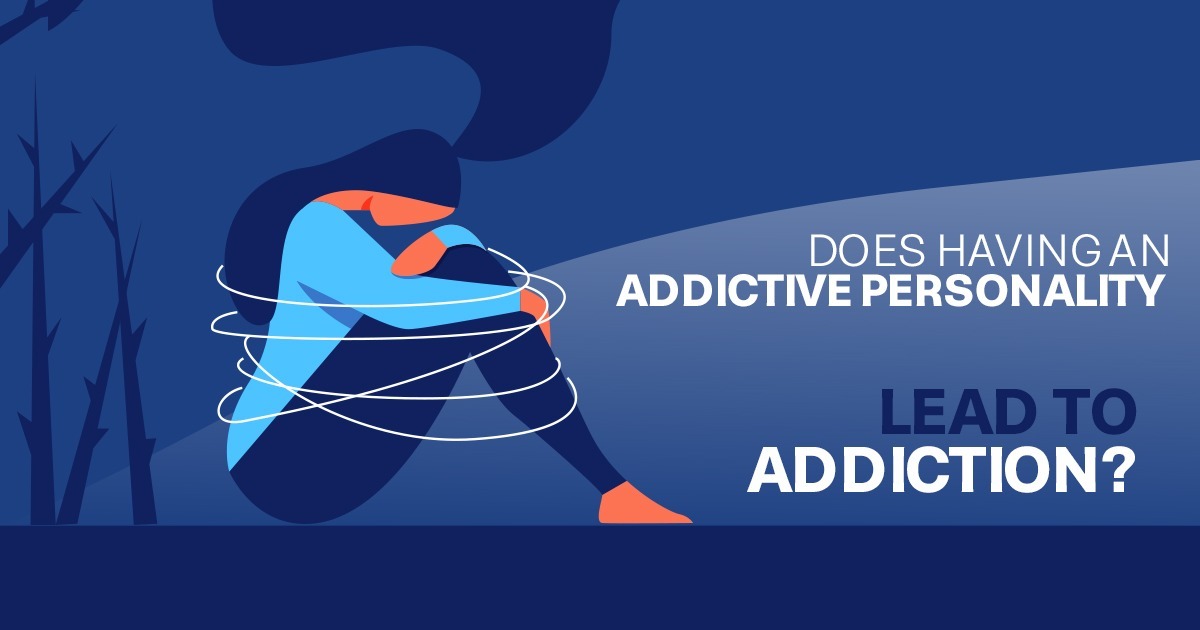When a person displays dependence on things like nothing else matters, begins to seem more anxious, distressed, and irritable, will do whatever they can to get drugs or alcohol at any cost? These are some of the signs of an addictive personality type. People with other mental health disorders also have addictive behavior.
Addictions are defined as behaviors highly likely to result in negative consequences for the individual. Addictive personality traits manifest as compulsions that interfere with one’s relationships, work, and health. A person with an addictive personality has a compulsion to use alcohol, drugs, or other substances or pursue a particular activity to exclude all else. The traits of an addictive personality include:
- Impulsiveness
- A need for instant gratification
- A disregard for consequences when seeking one’s desires
- The tendency to find more joy in serving self than in helping others
What is an Addictive Personality?
Addiction is a progressive disease that often requires intervention to break its hold on an individual. Behavior (process) addictions include a wide range of activities and substances to which people compulsively engage, despite the negative consequences; some examples are:
- Gambling
- Drugs
- Shopping
- Sex
- Food
- Gaming
- Porn
The concept of an “addictive personality” stems from the difference between these sorts of process addictions and substance abuse. There is an external addictive property for some substances; for instance, cigarettes have addictive ingredients, and some drugs cause physical dependence. Process addiction is more about getting addicted to a feeling or concept. This compulsion is where “addictive personalities” stem from.
Do I Have an Addictive Personality?
Do you constantly crave something, have a history of failed relationships, or are secretive about your behavior? If you answer yes to any of these questions, you could be hiding an addictive personality.
With drug and alcohol addiction, common environmental factors are stress and the availability of addictive substances. When a person has three or more of the following symptoms and problems for at least a year, they may have an addictive behavior – powerlessness to control and continuing desire/unsuccessful attempts to cut down, despite harmful consequences:
Compulsion
Compulsion means someone has an irresistible urge or an uncontrollable desire to perform a specific action. This type of behavior is described as compulsive drug-seeking. Addiction is a compulsion and dependency on a behavior or substance that can harm the addict or others. This condition involves the body, brain, and behavior and can lead to physical dependence and tolerance.
Cravings
The development of addictions can change the brain, affecting your ability to evaluate risk. It robs you of your decision-making mechanisms and has an enormous impact on your ability to resist drug abuse and stay clean from the seemingly enjoyable activity. Why? Because cravings cause intense physical and psychological urges, and even when you understand the consequences of taking that first drug, having cravings makes it challenging to resist.
Consequences
Drug abuse can lead to severe consequences for the addict and those around them. It can also cause serious side effects such as lung cancer, obesity, and depression. One who is addicted to illicit drugs will continue their habit despite the adverse effects and painful feelings. A person may lose interest in other parts of life because they are focused on getting or using their drug of choice, and that is where problems begin.
Control
People with addictions realize that their substance use is spiraling out of control initially, and they try to stop. But, for many people, stopping isn’t that easy. The physical cravings for drugs or alcohol are overwhelming. They may even force themselves to stop using the substance, but eventually, they start using it again.

Some things to look out for include:
- Difficulty with impulse control
- Lack of personal goals
- Susceptibility to risky, impulsive, or thrill-seeking behaviors
- Failure to take responsibility for actions
- Low self-esteem
- Intense mood swings or irritability
- Isolation or a lack of solid friendships
- A close relative who struggles with addiction
- Mental health conditions
What are the Most Common Addictions?
When we talk about addiction, tobacco, alcohol, and drug addiction tend to come to mind. It’s not unusual for coffee-lovers to describe themselves as caffeine addicts. Chemical dependence is when people with addictions become physiologically dependent and psychologically addicted to a substance.
Addiction has many faces. Being addicted to certain things can prevent you from having the life you always wanted. According to addiction experts and psychologists, the following are six of the most common habits that affect people today.
Drug Addiction
Drug addiction is a pattern of substance use that becomes compulsive and interferes with daily life. Some of the more commonly abused drugs are:
- Alcohol
- Marijuana
- Prescription Medications
- Cocaine
- Other Stimulants
The three main drugs that can cause the risk of addiction are:
- Stimulants
- Opioids
- Sedatives
The drugs in Opioids are usually used as legal treatments for chronic pains, but more often than not end up being addictive substances and cause significant bodily harm. These drugs use so many effects on the brain that they interfere instead of help.
Alcohol
Daily alcohol consumption is socially acceptable, even expected, but it can be the beginning of a dangerous addiction. Alcohol addiction can be difficult to determine because of the way that our society accepts social drinking. Even though alcohol is legal, the potential abuse and addiction can expose users to numerous health risks
Alcohol addiction is one of the most common addictions, and it is a compulsive need to drink alcohol constantly. The body becomes dependent on alcohol, requiring more significant amounts to feel “normal.” Alcohol addiction can be due to genetic factors, and it can be common among people with mental issues such as psychiatric diagnosis, depression, or anxiety.
Gambling
Gambling Addiction is a behavior that takes place inside the casinos, and casinos are, in general, closed places. It is hard for people around the individual suffering from gambling addiction to notice or even suspect that they are having some problems with gambling addiction.
Gambling Addiction can cause serious trouble to the person suffering from it. The people around them – their friends, family, or colleagues – might have no clue about this “hidden” addiction.
Sex
Sex addiction is a compulsive need to engage in sexual activity, despite negative consequences. Sex addiction may present in various ways, including sexual thoughts or fantasies, excessive masturbation, frequent (and often risky) sexual encounters, multiple affairs, exhibitionism/voyeurism, and more.
Many men and women grapple with out-of-control sexual behaviors and find themselves unable to stop despite the severe toll it takes on every area of their lives. Typically those affected by sex-related problems are people we know—friends, spouses, family members, or co-workers.
Social Media
Social Media Addiction is a term used to describe a person’s uncontrollable need to engage in social media sites. Often, people who suffer from addiction to social media have no interest in leaving their virtual life for the real one. Studies have found that people who use Facebook or Twitter regularly are three times more likely than average to develop a screen addiction and addiction to social media.
They’ll continue to use social media or messages at work (and get sacked), they’ll neglect partners or children to spend more time online. Withdrawal symptoms can include complete lethargy, depression, anxiety, and fear of being alone.
Relationships / Love
The term love addiction usually refers to a person’s excessive emotional need to be in a relationship. In any relationship, love addicts depend on their partners for happiness, fulfillment, and security. While healthy relationships can be nurturing, a person with an addictive personality requires more from a relationship than most people can provide.
Love addicts will use manipulation, games, and tantrums when their partner is unavailable or does not meet expectations. Both partners become addicted because the unhealthy relationship becomes the center of each partner’s life.

What Next?
Does this sound like you? Addiction comes in many forms, and many times people who suffer from these compulsions have a high chance of getting involved in substance abuse. If you or someone you love has an addictive personality or drug addiction, call Anchored Tides Recovery. We provide rehabilitative services and life coaching to women of all ages and backgrounds who have developed an addiction.




























